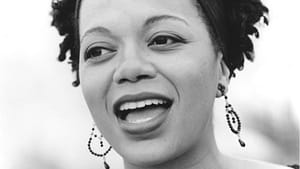Stay in the Loop
BSR publishes on a weekly schedule, with an email newsletter every Wednesday and Thursday morning. There’s no paywall, and subscribing is always free.
A unique and sonorous voice
Ruth Naomi Floyd at the Episcopal Cathedral

I first heard Ruth Naomi Floyd four years ago when she performed as the vocalist in Bobby Zankel’s big band arrangement of John Coltrane’s A Love Supreme at an outdoor concert on the Penn campus. A flashback to her fine mezzo-soprano voice and the depth and sincerity of her expression led me to attend a concert in which she was the featured soloist and composer — I just wanted to hear that voice again.
This time I was blown away. I began mentally comparing her to Mahalia Jackson, Marian Anderson, Kathleen Battle, and the other great African American singers who overcame racial barriers and had a lasting impact on the way music is sung. Philadelphia has been the home of many of the world’s great musical talents: add Floyd to the list.
The concert was an Episcopal Lenten Service, which gave Floyd the opportunity to emphasize her Christian spiritual commitment. The voices of Floyd and the Cathedral Singers, as well as director and cantor Thomas Lloyd, resonated beautifully in the sacred space, as did the sounds of the jazz ensemble consisting of Aaron Graves on piano and Lee Smith on bass, alternating with John Andrew Bailey as keyboardist for the more traditional arrangements. Traditional church and gospel music alternated seamlessly with music composed by Floyd, all of it reflecting classical, jazz, gospel, and traditional liturgical emphases in a way that transcended genres.
The program included Larry Farrow’s spiritual song of Americana, “Deep River”; two Duke Ellington arrangements from his famed “Sacred Concerts”; and the closing hymn, “Take My Hand, Precious Lord,” brought to the world’s attention by Mahalia Jackson. These alternated with Floyd’s original songs, including “Mercy,” “Surrounded,” and “Looking Above.”
I am Jewish, so I must tread lightly in interpreting lyrics based on Christian theology. What I took from them was a sense of intense guilt for harms done others combined with mercy and forgiveness, and a respect for the dignity of the most downtrodden among us. Floyd sang her own songs with a great seriousness that made me quake a little in my seat. She sings in a way that genuinely transforms the listener.
A voice as powerful as a gospel choir
This disciplined yet passionate singer truly transported me with “Precious Lord,” which showcased her magnificent voice. She built the song from quiet mourning to a voluminous reaching out to God for comfort, and in the end her voice had all the room-shaking power of a gospel church congregation, while showing the vocal discipline of the finest opera singer. And within all this, she paid closest attention to nuances of articulation and inflections reflecting the African American tongue and an array of self-expression that you only hear in jazz, and even then, rarely.
Born and raised in Philadelphia, Ruth Naomi Floyd began to develop her musical talents at the age of eight singing in church choirs and studying flute, bassoon, and piano. Over the course of her career, she has produced recordings dedicated to a jazz expression of the gospel, working with many of the most creative musicians of our time.
She is the daughter of urban missionaries, and embodies a deep spirituality in her music. She has dedicated her life to service to the community, especially those suffering from HIV/AIDS. In a humble and dedicated way, she has earned a place among the greatest divas of all genres.
What, When, Where
The Soul Cries Out: An Evensong for Lent. Featuring Ruth Naomi Floyd and the Cathedral Singers. March 6, 2016. Episcopal Cathedral, 3723 Chestnut Street, Philadelphia. philadelphiacathedral.org
Sign up for our newsletter
All of the week's new articles, all in one place. Sign up for the free weekly BSR newsletters, and don't miss a conversation.

 Victor L. Schermer
Victor L. Schermer